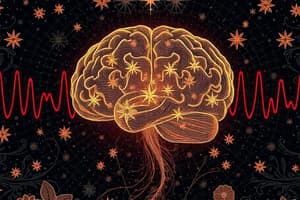Podcast
Questions and Answers
Which condition is associated with too little gamma wave activity?
Which condition is associated with too little gamma wave activity?
- Stress
- Learning disabilities (correct)
- Anxiety
- High arousal
What frequency range does gamma wave activity fall into?
What frequency range does gamma wave activity fall into?
- 12 Hz to 40 Hz
- 1 Hz to 8 Hz
- 8 Hz to 12 Hz
- 40 Hz to 100 Hz (correct)
Which of the following is a potential effect of excessive beta wave activity?
Which of the following is a potential effect of excessive beta wave activity?
- Inability to relax (correct)
- Poor cognition
- Learning retention
- Daydreaming
Beta waves are primarily associated with which of the following states?
Beta waves are primarily associated with which of the following states?
Which activity is likely to increase gamma wave production?
Which activity is likely to increase gamma wave production?
What is the optimal function of alpha waves?
What is the optimal function of alpha waves?
What is the highest frequency range for brain waves discussed?
What is the highest frequency range for brain waves discussed?
Excessive caffeine consumption typically affects which type of brain wave activity?
Excessive caffeine consumption typically affects which type of brain wave activity?
Which brain wave frequency is the highest among the five types?
Which brain wave frequency is the highest among the five types?
What role does the flexibility of brain waves play in mental functioning?
What role does the flexibility of brain waves play in mental functioning?
What might result from an imbalance in the production of the different brain waves?
What might result from an imbalance in the production of the different brain waves?
Which brain wave frequency is primarily associated with deep sleep?
Which brain wave frequency is primarily associated with deep sleep?
During which state of consciousness might alpha and theta brain waves be more dominant?
During which state of consciousness might alpha and theta brain waves be more dominant?
How many types of brain waves does an EEG display at once?
How many types of brain waves does an EEG display at once?
Which brain wave is known to be involved in rapid-eye movement (REM) sleep?
Which brain wave is known to be involved in rapid-eye movement (REM) sleep?
What is the primary purpose of each type of brain wave?
What is the primary purpose of each type of brain wave?
Flashcards are hidden until you start studying
Study Notes
Brain Waves Overview
- Humans exhibit five distinct brain wave types: gamma, beta, alpha, theta, and delta, each with specific frequencies and roles.
- Brain wave patterns can be recorded using an electroencephalograph (EEG).
- The ability to transition between brain wave frequencies is crucial for managing stress, focusing, and sleep.
Gamma Waves
- Frequency range: 40 Hz to 100 Hz (Highest frequency).
- Associated with higher cognitive tasks, learning, memory, and perception.
- Optimal for binding sensory experiences and involved in REM sleep.
- Low gamma activity linked to learning disabilities and mental challenges.
- Excessive gamma can result in anxiety and stress, while insufficient gamma can contribute to ADHD and depression.
- Can be increased through meditation.
Beta Waves
- Frequency range: 12 Hz to 40 Hz (High frequency).
- Dominant while awake; support conscious thought, logical reasoning, and task completion.
- Excessive beta activity can lead to stress, anxiety, and difficulty relaxing, while too little can result in daydreaming and poor cognition.
- Stimulated by caffeine and other stimulants.
- Essential for focus, memory, and problem-solving.
Alpha Waves
- Frequency range: Bridges conscious and subconscious states between beta and theta.
- Plays a role in relaxation and mental coordination.
- Typically present during calm, relaxed states, promoting creativity and stress reduction.
- Balances higher frequency activities of beta waves and lower frequencies of theta waves.
Theta Waves
- Frequency range: 4 Hz to 8 Hz.
- Linked to deep relaxation, meditation, creativity, and emotional connection.
- Often present during light sleep and REM, aiding in memory consolidation.
- Inappropriate dominance can lead to daydreaming or lack of focus.
Delta Waves
- Frequency range: 0.5 Hz to 4 Hz (Lowest frequency).
- Associated with deep sleep and restorative processes.
- Crucial for healing and regeneration, as well as immune system support.
- Excessive dominance could indicate issues with memory or cognition.
Studying That Suits You
Use AI to generate personalized quizzes and flashcards to suit your learning preferences.




